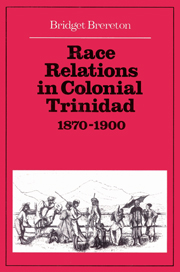Book contents
- Frontmatter
- Contents
- Acknowledgements
- Glossary
- 1 Introduction
- 2 The environment
- 3 The white elite
- 4 Education and mobility
- 5 The rise of a coloured and black middle class
- 6 The urban labouring population
- 7 The black rural masses
- 8 The souls of black folk
- 9 The Indians
- 10 Racism and race relations: the divided society
- Abbreviations
- Notes
- Bibliography
- Index
2 - The environment
Published online by Cambridge University Press: 08 October 2009
- Frontmatter
- Contents
- Acknowledgements
- Glossary
- 1 Introduction
- 2 The environment
- 3 The white elite
- 4 Education and mobility
- 5 The rise of a coloured and black middle class
- 6 The urban labouring population
- 7 The black rural masses
- 8 The souls of black folk
- 9 The Indians
- 10 Racism and race relations: the divided society
- Abbreviations
- Notes
- Bibliography
- Index
Summary
The population of Trinidad increased fairly rapidly in the second half of the nineteenth century, from 84,438 in 1861 to 200,028 in 1891. Much of this increase was the result of immigration, particularly from the British West Indies, India, and Venezuela. Nineteenth-century Trinidad was, very clearly, an immigrant society. In 1861 about forty-four per cent of the population (37,502) was not born in Trinidad, and the proportion was about the same in 1891. Of the immigrants, natives of India numbered 13,488 in 1861 and 45,028 in 1891; natives of the British West Indies numbered 11,716 in 1861 and 33, 180 in 1891. A smaller group consisted of natives of ‘foreign countries’, mainly Venezuela and the French and Spanish West Indies. Natives of Africa decreased in numbers between 1861 and 1891, for liberated Africans ceased to arrive after 1861. Numbering 6,035 in 1861, they were only 2,055 by 1891. In 1871, for the first time, Creoles of East Indian parentage were categorised separately, numbering 4,545; by 1881 the figure was 12,800. But the censuses did not classify racial groups, only place of birth. In 1891 a religious census was included, which showed Roman Catholics leading with 73,733 adherents, followed by ‘Coolie and Chinese’ (i.e. Hindu, Moslem, Confucian, Buddhist) with 64,413, Anglicans with 46,920, Wesleyans with 6,312.
The capital city, Port of Spain, grew steadily in population between 1861 and 1891; a high proportion of the colony's population was concentrated in the borough and its suburbs. In 1861 its population was 18,980; by 1881 the census recorded 31,858 in the city proper and another 2,706 in Laventille.
- Type
- Chapter
- Information
- Race Relations in Colonial Trinidad 1870–1900 , pp. 12 - 33Publisher: Cambridge University PressPrint publication year: 1980



